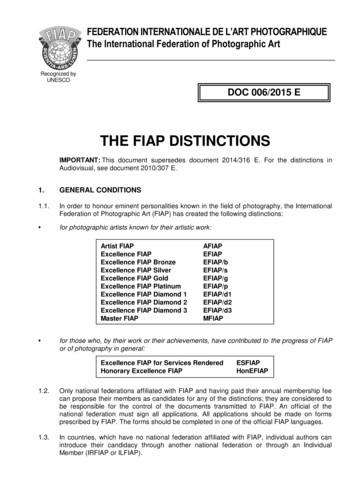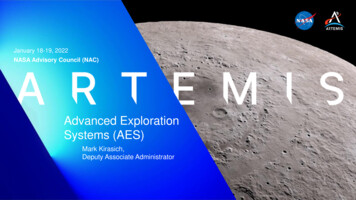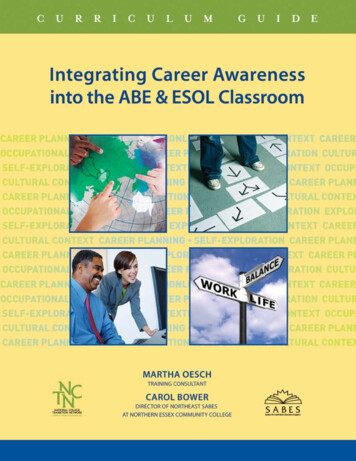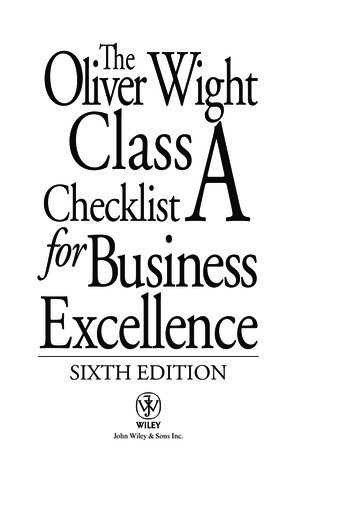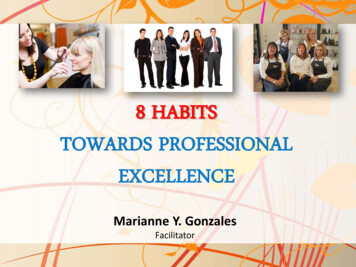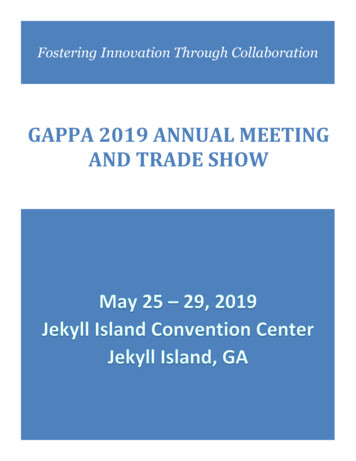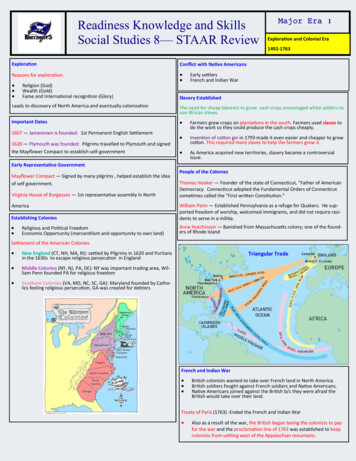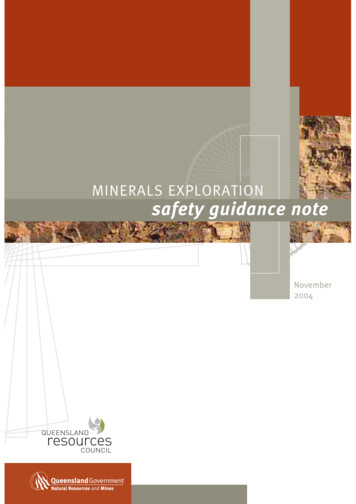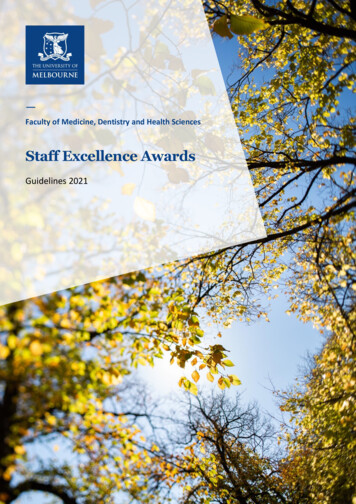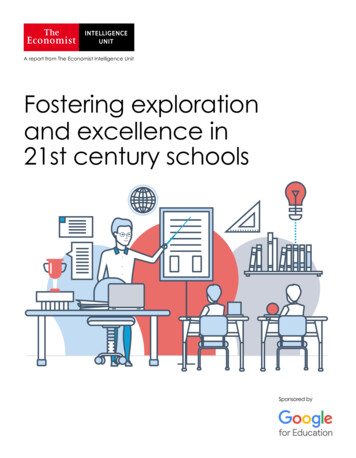
Transcription
A report from The Economist Intelligence UnitFostering explorationand excellence in21st century schoolsSponsored by
Fostering exploration and excellence in 21st century schoolsContents1Executive summary2About the research4Introduction61Strategies for the 21st century classroom82The critical role of technology113Teacher quality counts144Implementing innovation16Conclusion18Appendix: survey results19 The Economist Intelligence Unit Limited 2018
Fostering exploration and excellence in 21st century schoolsExecutivesummaryEducation systems across the world arewhich took a broad approach in assessinggrappling with the challenge of preparingshifts in skills needs.2 That research examinedtheir students for the rapid changes they willwhether the skills taught in education systemsexperience during their lifetimes. To this end,across the world were changing and meetingschools have a critical role in equippingthe needs of employers and societies.Our latest study suggests that a holisticstudents with the requisite skills andcompetencies that will be in demand,approach, integrating different educationalparticularly as digital technologies such asstrategies and techniques, is most effective forartificial intelligence (AI) increasingly transformdeveloping the skills needed for success.businesses and influence economies.Among these, it includes empoweringIn this report, The Economist Intelligenceteachers by giving them greater autonomy toUnit (EIU) discusses the results of a study thatinnovate and applying teaching strategiesexplores how to best prepare primary andthat engage students through hands-on andsecondary school (referred to in this report ascollaborative activities. Implementation of“K-12”) students for the 21st centurythese initiatives faces numerous complexworkplace (“the modern workplace”), wherechallenges, including resource limitations, buta mix of hard and soft skills are crucial forfailure will leave many of today’s youngsuccess. The research, sponsored by Googlestudents unprepared for the life and workfor Education, draws on a survey of 1,200challenges they will face as economies andeducators in 16 countries. It looks at thesocieties develop.1strategies most effective in developing 21stcentury skills and how technology can supportsuch efforts. By focusing on successfulimplementation of key strategies from theperspective of K-12 educators, this research A range of teaching strategies is needed toeffectively deliver the types of learningbuilds upon a 2015 EIU study, Driving the skillsneeded to prepare students for the 21stagenda: Preparing students for the future,century workplace.12The key insights from the research are:Argentina, Australia, Brazil, Canada, Colombia, Denmark,Finland, Japan, Mexico, the Netherlands, Singapore, Spain,South Korea, Sweden, the UK and the US. The Economist Intelligence Unit Limited 20182The Economist Intelligence Unit, 2015 “Driving the skillsagenda: Preparing students for the future,” ing-skills-agenda
Fostering exploration and excellence in 21st century schoolsA large majority of educators surveyedautonomy teachers enjoy and schools’(79%) believe that soft skills need to bereadiness to teach 21st century skills.developed alongside foundationalEducators who assessed their schools asliteracies. Educators most frequently cite thehaving “much better” teacher autonomyfollowing teaching strategies as “verythan other schools in their country far moreimportant” in developing the skills neededoften report being “very well equipped” toin the 21st century workplace: activeteach both foundational literacies and softlearning (51%), project-based learningskills, such as communication (48% v 25% for(45%), cognitive activation (42%) andthe rest of the sample).personalised learning (40%).3 Educators alsoconsider these four strategies as proven tobe the most effective in developingneeded skills. Technology can support the effectiveand technologies.Educators most frequently cite budgetlimitations as by far the most significantbarrier to adopting both new teachingpromoting interaction, engagement andstrategies (51%) and technologies (53%). Acommunication.lack of technology access in schools andFour in five (82%) educators agree thatpolicy gaps are also notable challenges.technology is a valuable tool forOn a regional level, budget constraintsdeveloping skills for the modern workplace.remain a top challenge for innovation, withTechnology is seen as most effective inNorth American educators most oftenenhancing the top teaching strategies forreporting these as an obstacle to adoptingdeveloping 21st century skills, as it can benew strategies (59%) and technologiesused to promote interaction, engagement(61%). 3cited obstacle in adopting new strategiesexecution of teaching strategies byand collaboration.3 Budget limitations are the most frequentlyTeacher quality is key. Teacher autonomy Educators most often favour a cautiousapproach to adopting new teachingalso matters and is a significant factor instrategies and technologies.shaping schools’ preparedness to teachOpinions vary over how quickly schools21st century skills.should innovate within the classroom.Good teachers need a supportiveHowever, educators most often advocate aframework to make the most of their talents,cautious approach for implementing newincluding adequate resources, training andteaching strategies (39%) and technologiesa well-planned curriculum. There is a strong(40%), allowing for each to be investigatedcorrelation between the degree ofand tested before adoption.See page 8 for definitions of teaching strategies. The Economist Intelligence Unit Limited 2018
Fostering exploration and excellence in 21st century schoolsAbout theresearchFostering exploration and excellence in 21strepresented in the survey sample include:century schools is an Economist IntelligenceArgentina, Australia, Brazil, Canada,Unit (EIU) research programme sponsored byColombia, Denmark, Finland, Japan, Mexico,Google for Education. It investigates thethe Netherlands, Singapore, Spain, Southteaching strategies that are most effective inKorea, Sweden, the UK and the US.preparing K-12 students for their future workingWe would like to thank the following (listedlives, as well as how technology can helpalphabetically) for their time and insights.support key initiatives. This research builds Alex Beard, senior director, Teach For All,upon The EIU’s 2015 study, Driving the skillsand author of the forthcoming book,agenda: Preparing students for the future,which examined whether the skills taught ineducation systems across the world werechanging and meeting the needs ofemployers and societies. That study involvedfour global surveys of senior businessNatural Born Learners Esteban Bullrich, national senator andformer minister of education, Argentina4 Marco Fernández, research professor,School of Government and Public Policy,executives, teachers, and students agedInstituto Tecnológico y de Estudios11-17, and 18-25.Superiores de Monterrey (Tec deMonterrey), and researcher at MéxicoIn addition to reviewing the 2015 study andEvalúaconducting substantial desk research, thisreport is based on a four-part researchprocess undertaken in 2017. This involved a Howard Gardner, professor of cognitionand education, Graduate School ofliterature review, a series of advisory interviewswith five education experts, a global survey of1,200 educators, and five additional interviewsEducation, Harvard University David Hung, associate dean of educationresearch, National Institute for Education,with experts in education and employmentNanyang Technical University, Singaporeskills following the survey.The survey sample consisted of a mix ofprimary and secondary school teachers (70%),and administrators, principals and viceprincipals (30%) in 16 countries. Countries4 The Economist Intelligence Unit Limited 20184Esteban Bullrich was the minister of education at the time ofhis interview with The EIU in June 2017. At the time ofpublication, he is now a national senator.
Fostering exploration and excellence in 21st century schools Ewart Keep, professor and director of theCentre for Skills, Knowledge andOrganisational Performance (SKOPE),University of Oxford Neil Mercer, emeritus professor of Justin Reich, assistant professor ofeducation, University of CambridgeComparative Media Studies, MassachusettsInstitute of Technology (MIT), and director ofthe MIT Teaching Systems Lab5 The Economist Intelligence Unit Limited 2018 Andreas Schleicher, director for theDirectorate of Education and Skills, OECD Caitlin Storhaug, head of globalrecruitment marketing andcommunications, McKinseyThe report was written by Nicholas Walton andedited by Veronica Lara of The EIU.
Fostering exploration and excellence in 21st century schoolsIntroduction“[Employers]want goodcommunicators,listeningmanagers andeffective teamplayers—peoplewho can comeup with newideas and sharewhat theyknow.”Neil Mercer,emeritus professor ofeducation, University ofCambridgeAlthough robots and AI are unlikely to replacewere identified by interviews with educationhumans entirely, these and other rapidlyexperts: values and ethics, and a capacity forevolving technologies do promise tolifelong learning. The survey found there isrevolutionise the workplace in the near future.general consensus among educators that softAs routine tasks are further replaced byskills are as important as foundational literaciesautomation, jobs in the 21st century will(ie, mathematics, sciences and reading) inrequire very different demands, underscoringpreparing students to succeed professionally.the need to prepare the children of today forAs industries are disrupted by newa different world than the one of previoustechnologies that put a premium on the abilitygenerations.to use information, these skills will becomeThe most sought-after skills in the moderneconomy are already non-traditional, softJustin Reich, assistant professor ofones, according to our 2015 Driving the skillsComparative Media Studies at MIT, andagenda: Preparing students for the futuredirector of the MIT Teaching Systems Lab, saysreport. As part of that research programme,the emphasis needs to be on the two “areaswe surveyed senior business executives andwhere humans have a comparativefound that problem solving was the mostadvantage over computers.” The first isin-demand workplace skill, followed by“ill-structured problem solving, where youcollaboration, communication, criticaldon’t know what data you need or what thethinking and creativity. “Employers are cryinganswer looks like”; and second, complex orout for those skills,” says Neil Mercer, emerituspersuasive communication. Both also requireprofessor of education at the University ofa large amount of specialist domainCambridge. “They want goodknowledge, acquired during formalcommunicators, listening managers andeducation and beyond.effective team players—people who canAs the nature of work changes, schoolscome up with new ideas and share what theyplay a pivotal role in preparing the youngknow.”children of today for the jobs and economicOur 2017 global survey of educators6even more important.opportunities of the 21st century. Indeed, ourdefined a core set of soft skills that includedsurvey found that 81% of educators surveyedthe five listed above, as well as two more thatagree that teachers must consider future skills The Economist Intelligence Unit Limited 2018
Fostering exploration and excellence in 21st century schoolsneeds when educating their students. Therapidly changing global economy.5 “The costprimary and secondary periods of schoolingof not doing so is losing competitiveness to theare when many of these literacies and skillsrest of the world,” says Marco Fernández,are first acquired, as students socialise, graspresearch professor at the School ofand begin to apply concepts, and gain theGovernment and Public Policy at Tec deability to learn.Monterrey and researcher at México Evalúa,Professor David Hung, associate dean ofan independent think-tank. Althougheducation research at Singapore’s Nationalrecognising this risk, he notes that MexicoInstitute for Education, says that students needstruggles to reform its education system toto be taught “certain cognitive, social,meet the needs of the 21st century.emotional regulatory skills”, such as self-In too many cases, experts acknowledgediscipline and curiosity, when they are still verythese looming challenges. Alex Beard, senioryoung. Andreas Schleicher, the director for thedirector at Teach For All, a global network ofDirectorate of Education and Skills at theorganisations that encourages high achieversOECD, agrees, saying that social andto spend time as classroom teachers, says thatemotional skills such as “the capacity to workeducation systems are failing to keep pacewith people who are different from them,with wider developments in areas likeunderstand different ways of thinking andtechnology and the global economy.working” are very important in these critical“Education risks being left behind” by howyears.quickly change is happening, he says.Getting education systems right is importantOur 2015 report found that executives werefor communities and countries, as well asnot satisfied with the attainment levels ofindividuals. “As economies evolve, educationyoung people, with over half believing thatsystems clearly have to drive that,” saysthis skills gap was hampering theirMr Schleicher. He says that in advancedorganisation’s performance. Teacherseconomies there is far less emphasis onrecognised that companies were unhappyknowing things, as so much knowledge iswith education standards, but how theseeither easily accessible online or evolvesdeficiencies can be addressed remains arapidly. Instead, “it’s about thinking like acomplicated question. This report focuses onmathematician, scientist or historian,”the implementation of successful initiatives indeveloping cognitive skills and having theK-12 classrooms. What do educators at these“capacity to navigate knowledge.”levels say are the most effective strategiesMiddle-income countries such as Mexicoface similar challenges, as they adapt to theand tools that support the development of21st century skills?57 The Economist Intelligence Unit Limited 2018The World Bank defines “middle income” countries (includingboth “lower” and “upper” middle income countries) ashaving a Gross National Income per capita of betweenUS 1,006 and US 12,235. They are likely to have intermediatelevels of industrialisation and have tighter government (andtherefore education) budgets than richer countries. rticles/906519
Fostering exploration and excellence in 21st century schools1“Teachers areamong thehighesteducatedworkforces, so itseems crazy tome that youwouldn’t giveautonomy andgreaterownership tothem.”Alex Beard,senior director,Teach For AllStrategies for the21st century classroomAlthough nearly half (45%) of educators in themost likely to cite as “very important”:survey report feeling empowered to make active learning (ie, engaging students indecisions about how best to help theirstudents develop 21st century skills, almost athird (31%) say they feel constrained in doingso, including 8% who feel “very constrained”.At a regional level, educators in Asia-Pacific(36%) and Europe (35%) more often say theyfeel constrained compared with those in LatinAmerica (22%) and North America (26%).“Teachers are among the highest educatedworkforces,” argues Mr Beard, “so it seemscrazy to me that you wouldn’t give autonomyand greater ownership to them.”Addressing the growing need for soft skillsdiscussion and/or problem solving); project-based learning (ie, students workingon complex and/or real-world challenges); cognitive activation (ie, encouragingstudents to focus on the method they use toreach a solution rather than the solutionitself); and personalised learning (ie, addressing theneeds and interests of individual students).Notably, Latin American educators mostfrequently cite nearly every teaching strategydoes not mean abandoning the foundationalincluded in the survey as “very important”,literacies that are currently taught; 79% ofwith North American educators following fairlyeducators agree they are both equallynear behind, and Asia-Pacific and Europeanimportant (with 46% strongly agreeing).educators far behind.Mr Schleicher strongly argues that characterThe survey finds there is an alignmentqualities, such as courage, leadership,between the teaching strategies consideredempathy, resilience and curiosity, can bemost effective and the ones educators mostdeveloped within more formal subjects, likefrequently cite as “very important” forsciences or language, rather than be taughtpreparing students for their future work. Byseparately.contrast, only 18% consider traditionalThe survey results show that a range of8activities, such as reading, writing,teacher-directed instruction as one of theteaching strategies are needed, and that themost effective strategies, and only 32% think itones most commonly cited as effective areis very important for preparing students.those that promote interaction, engagementOverall, this is consistent with the finding thatand collaboration. When asked to evaluate76% of educators believe students benefitthe importance of specific teaching strategiesmore from hands-on learning than formalin developing needed skills, educators arelectures. The Economist Intelligence Unit Limited 2018
Fostering exploration and excellence in 21st century schoolsMost important teaching strategies for workplace-ready skills development vs most effectivestrategies(% of respondents)Strategies educators call “very important”Most effective strategiesActive learning45Project-based learning4222Personalised learning3218Formative assessments311713Some respondents in the survey shared25Source: Economist Intelligence Unit survey, 2018.education at the Harvard Graduate School ofexamples of strategies and techniques thatEducation. The ability to understand howsuccessfully fostered the development of softknowledge is applied in real-life situations willskills and could be replicated. One Canadianhelp students adapt to a world where thevice-principal noted that project-basedrequired knowledge will change as rapidly aslearning was useful for teaching teamwork,the technologies used at work.communication and leadership skills. AThis continuous change in technologiesSingaporean school administrator said it wasmeans the knowledge and skills that today’sgood for developing both hard and soft skills.children develop in formal education willA secondary school teacher in the US saidneed to be updated or revamped to remaincollaborative group work helped to fosterrelevant throughout their working lives. Thiscritical thinking, by understanding andmeans that schools must equip students withassessing ideas from other children, while athe capacity and initiative to continue toColombian teacher said it built confidence.learn beyond formal education.Several educators cited role-playing as a“People are going to have to be moretechnique that taught children differentself-reliant in thinking how their career is goingperspectives on an issue.to develop, how they’re going to invest in theirSeveral educators in the survey said theyown skills,” says Ewart Keep, professor andhad success in taking education outside thedirector of SKOPE at the University of Oxford.classroom, for instance through study trips andCaitlin Storhaug, head of global recruitmentencouraging parents to get involved. This canmarketing and communications for ahelp students link their more formal studies toconsultancy, McKinsey, agrees, saying thethe wider world, applying concepts to real life.ability to keep learning is vital for her firm’sSuch an integrated approach is consideredemployees: “We absolutely don’t expect ouressential to educational attainment by 73% ofpeople to know everything when they comeeducators. “It’s not just the six hours in schoolto us, but to be interested to learn from theirthat make the difference, but how thatteams.”connects to what else happens during the94028Teacher-directed instructionSummative assessments4534Cognitive activation51For today’s young students, this ability toremaining waking hours,” says Howardlearn and relearn will be a crucial part ofGardner, professor of cognition andsuccess in a constantly evolving world. Parents The Economist Intelligence Unit Limited 2018
Fostering exploration and excellence in 21st century schoolsand guardians need to play a role in this; 77%emphasis can crowd out this aspect: Mr Hungof educators in the survey believed that theirsays that some students in Singapore andengagement was critical in developing aother East Asian countries can be persuadedcapacity for lifelong learning.to concentrate too heavily on academicThe social side of early schooling is also10achievements from an early age, neglectingimportant, as this gives students thetheir social regulatory skills. Mr Beard says thisexperience of interacting in a public space,socialising aspect of schools can also have anand learning how to communicate and workimportant impact on the children’s futurewith other children. Too much academicmental wellbeing. The Economist Intelligence Unit Limited 2018
Fostering exploration and excellence in 21st century schools2The critical role of technologyAlthough technology is revolutionising boththe modern workplace, with 46% agreeingwork and wider society, it is also having anstrongly. Approximately three in four say itimpact in the classroom. About four in fiveenhances project-based learning (76%), and(82%) educators surveyed agree thatcan make education both more collaborativetechnology is valuable for developing skills for(75%) and personalised (72%).To what degree do you agree or disagree with each of the following statements?(% of respondents)“Strongly agree”Technology is a valuable tool in developingskills for the modern workplaceStudents can be more engaged whentechnology is used as part of lessonsTechnology can helpteachers develop curriculaTechnology can enhanceproject-based learningIntegration of technology in the classroomcan make learning more collaborativeIntegration of technology in the classroomcan make learning more personalisedTechnology can improveteacher-parent engagementEducators who report having “muchtheir school (22% of the sample) relative to11Total agree4636823740773740773640344034293939Note: Percentages may not equal total due to rounding.better” technology adoption and usage at“Somewhat agree”76757267Source: Economist Intelligence Unit survey, 2018.increasing student (and parental)engagement to personalising learning.The survey shows that technology is mostothers in their country show higher levels ofeffective at supporting the four teachingconfidence in its benefits. The majority (61%)strategies that are most frequently cited asof these educators strongly agree thatimportant for preparing students for thetechnology is a valuable tool for developingmodern workplace: project-based learningworkplace-ready skills, compared with 41% of(80%), active learning (78%), personalisedthe rest of the sample. Moreover, educators atlearning (76%) and cognitive activation (74%).technologically progressive schools feel moreTechnology is also considered effective inpositively about its power to shape varioussupporting other teaching strategies exploredaspects of the teaching experience studied inin the survey by approximately seven in tenthe survey, from developing curricula andeducators. The Economist Intelligence Unit Limited 2018
Fostering exploration and excellence in 21st century schoolsMost important strategies for workplace-ready skills development vs effectiveness of technology tosupport strategies(% of respondents)Strategies educators call “very” or “somewhat” importantStrategy educators say is “very” or “somewhat” effectively supported by technologyActive learning8378Personalised learning8176Cognitive activation81747980Project-based learningFormative assessments7471Teacher-directed instruction70Summative assessments687370Source: Economist Intelligence Unit survey, 2018.Educators surveyed note that widespreadaccess to innovative lesson plans. Educationaltechnologies such as interactive whiteboards,games can help engage students and makee-books or portable devices for homeworklearning more enjoyable. Speaking from hiswere effective aids to teaching, with laptopsexperience teaching history, Mr Reich saysconsidered the most useful. Thesetechnology allows students to find a widertechnologies can allow individually tailoredrange of source material for studies.modules, free up teachers’ time and provideMost effective technologies(% of respondents)Laptops35Educational games32Interactive whiteboards29Educational videos27Tablets and/or e-readers27Age- or subject-specific apps and/or content26Productivity tools that encourage collaboration24Learning management systems21Openly licensed educational resourcesMobile phones2013Source: Economist Intelligence Unit survey, 2018.Technology has the potential for helpingminister for Argentina, Esteban Bullrich, saysmiddle-income countries address weaknessesthat connecting all the country’s schools toin their education systems. For instance,the internet was a vital component of theMr Hung observes, “it can solve the one-reforms he introduced.teacher-to-many-students problem,” while12When not used appropriately, however,educating those students in things that cantechnology can sometimes be costly andbe challenging for overworked teachers, suchcounterproductive. Mr Beard says that schoolsas seeing things from multiple perspectives oracross Los Angeles were given tablets afterpromoting collaboration. A former educationencouraging trials. But, he notes, “it was a The Economist Intelligence Unit Limited 2018
Fostering exploration and excellence in 21st century schoolsfiasco, with kids using them to watch YouTubeperiod of personalised-learning and problem-during class.” Mr Beard cites the Rocketshipsolving time each day on laptops. Teacherspublic charter school network in the US as ancan utilise the time saved for planning andexample of where technology is usedengaging students in collaborative learning.effectively. He says their students have a6613Rocketship Public Schools, http://www.rocketshipschools.org/ The Economist Intelligence Unit Limited 2018
Fostering exploration and excellence in 21st century schools3“If you have tomake a choicebetween abetter teacherand a smallerclass, always gofor the betterteacher.”Andreas Schleicher,director for theDirectorate of Educationand Skills, OECDTeacher quality countsThe experts interviewed for this paper agreedarea. To develop such skills, the survey datathat the common feature at the heart ofshow teachers can benefit from a wideevery effective education system is high-variety of professional development methods,quality teachers. “If you have to make aincluding personalised learning, large groupchoice between a better teacher and atraining, project-based learning and mentorsmaller class, always go for the bettersupport.teacher,” says Mr Schleicher. High-qualityteachers are essential to meet the challengesGardner says that effective teachers must beoutlined in this paper, including equippingable to educate children to deal with differentchildren with a range of non-traditional skillsand unfamiliar timeframes. “They now have toand being able to unlock the potential ofthink about how the world will be in 20 years,education technology.or 30, or even when their young students areCountries with top-performing educationat the later stages of life.” To do this, he says,systems, such as Finland and Singapore,teachers need a broader “liberal arts andconcentrate efforts in motivating goodsciences” education themselves rather thanstudents to become teachers, and teachingnarrower training in classroom skills.enjoys a high professional status relative toGood teachers need a supportiveother countries. Appropriate training,framework to make the most of their talents,including in non-formal skills such asincluding adequate resources and a well-communication and critical thinking, thenthought-out curriculum. The survey findingsallows these teachers to draw out similar skillsindicate a strong correlation between thein their students.degree of autonomy teachers enjoy andTeachers need to be able to take the14With the rapid pace of change, Mrschools’ readiness to teach 21st century skills.initiative and have the flexibility to useOne in five educators surveyed said teacherspedagogies such as project-based andat their schools have “much better”collaborative learning, and to help studentsautonomy than other schools in their country.understand how to apply concepts andAbout half (48%) of these educators say theyknowledge outside the classroom. Mr Mercerare also “very well equipped” to teachsays that improving teachers’ communicationcommunication skills, compared with askills helps them to interact more effectivelyquarter (25%) of those at schools with lesswith the students, but that teacher trainingautonomy. Similar gaps appear for other 21stoften neglects what he calls an “obvious”century skills explored in the survey. The Economist Intelligence Unit Limited 2018
Fostering exploration and excellence in 21st century schoolsHow well equipped are the teachers at your school to teach students each of the following skills?(% of respondents who say they are “very well equipped”)Educators who rate their school as having “much better” teacher autonomyFoundational literaciesCollaborationProblem solvingCritical thinking4825Values and ethicsCreativity4928CommunicationCapacity for lifelong learningAll other educators472645234424432342243724Source: Economist Intelligence Unit survey, 2018.T
21st century skills. Good teachers need a supportive framework to make the most of their talents, including adequate resources, training and a well-planned curriculum. There is a strong correlation between the degree of 3 See page 8 for definitions of teaching strategies. autonomy teachers enjoy and schools' readiness to teach 21st century .
